Fleurs du Mal Magazine


Or see the index

The Sorrows of Young Werther (14)
by J.W. von Goethe
JUNE 29.
The day before yesterday, the physician came from the town to pay a visit to the judge. He found me on the floor playing with Charlotte’s children. Some of them were scrambling over me, and others romped with me; and, as I caught and tickled them, they made a great noise. The doctor is a formal sort of personage: he adjusts the plaits of his ruffles, and continually settles his frill whilst he is talking to you; and he thought my conduct beneath the dignity of a sensible man. I could perceive this by his countenance. But I did not suffer myself to be disturbed. I allowed him to continue his wise conversation, whilst I rebuilt the children’s card houses for them as fast as they threw them down. He went about the town afterward, complaining that the judge’s children were spoiled enough before, but that now Werther was completely ruining them.
Yes, my dear Wilhelm, nothing on this earth affects my heart so much as children. When I look on at their doings; when I mark in the little creatures the seeds of all those virtues and qualities which they will one day find so indispensable; when I behold in the obstinate all the future firmness and constancy of a noble character; in the capricious, that levity and gaiety of temper which will carry them lightly over the dangers and troubles of life, their whole nature simple and unpolluted,–then I call to mind the golden words of the Great Teacher of mankind, “Unless ye become like one of these!” And now, my friend, these children, who are our equals, whom we ought to consider as our models, we treat them as though they were our subjects. They are allowed no will of their own. And have we, then, none ourselves? Whence comes our exclusive right? Is it because we are older and more experienced?
Great God! from the height of thy heaven thou beholdest great children and little children, and no others; and thy Son has long since declared which afford thee greatest pleasure. But they believe in him, and hear him not,–that, too, is an old story; and they train their children after their own image, etc.
Adieu, Wilhelm: I will not further bewilder myself with this subject.
The Sorrows of Young Werther (Die Leiden des jungen Werther) by J.W. von Goethe. Translated by R.D. Boylan.
To be continued
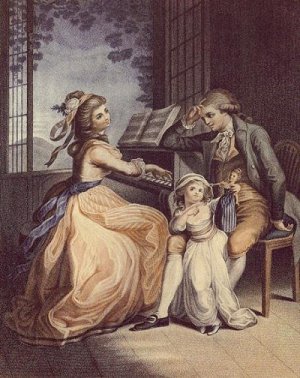
fleursdumal.nl magazine
More in: -Die Leiden des jungen Werther, Goethe, Johann Wolfgang von

Freda Kamphuis:
woordverduistering – collage – 2014
fleursdumal.nl magazine
More in: *Concrete + Visual Poetry K-O, Freda Kamphuis, Kamphuis, Freda
Kate Tempest started out when she was 16, rapping at strangers on night busses and pestering mc’s to let her on the mic at raves. Ten years later she is a published playwright, poet and respected recording artist.
Her theatre writing includes Wasted for Paines Plough, Brand New Ancients for the BAC, and Glasshouse for Cardboard Citizens.
She has written poetry for the Royal Shakespeare Company, Barnado’s, Channel 4 and the BBC. She has worked with Amnesty International to create a schools pack helping secondary school children write their own protest songs, and was invited to write and perform a new poem for Aung San Suu Kyi when she recieved the Ambassador of Conscience award in Dublin.
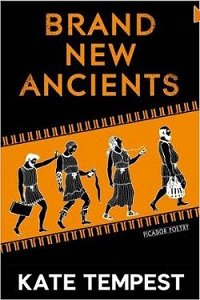
Kate released her debut album Balance with Sound of Rum in 2011. She has featured on songs with Sinead O Connor, Bastille, the King Blues, Damien Dempsey, Pink Punk, and Landslide. She has just finished recording a new solo album Everybody Down with acclaimed music producer Dan Carey. She’s toured extensively, supporting Billy Bragg on his UK tour, as well as supporting Scroobius Pip, Femi Kuti, Saul Williams and John Cooper Clarke. She is 2 x slam winner at the prestigious Nu-Yorican poetry cafe in New York. She’s played all the major UK and European music festivals either solo or with Sound of Rum. She’s headlined Latitude festival and her poetry has been featured on the BBC’s Glastonbury highlights. In 2012 she launched her first poetry book to a sell out crowd at the Old Vic theatre in London.
She’s led workshops in schools, colleges and youth groups across the UK and taught a creative writing class at Yale. She’s given lectures at Goldsmiths University and to newly qualified English teachers for the Prince’s Teaching Institute.
Her first spoken word release Broken Herd came out on Pure Groove in 2009. Her poetry book/CD/DVD package Everything Speaks in its Own Way was published on her own imprint Zingaro in 2012, and is available now from this site: # website kate tempest
A new collection of poetry will be out in 2014, published by Picador.
Kate Tempest: Brand New Ancients On Film – Part 1
In association with the Brand New Ancients tour, Battersea Arts Centre in collaboration with director Joe Roberts, has produced three short films interpreting Kate’s spoken word through moving image.
fleursdumal.nl magazine
More in: Archive S-T, Art & Literature News, AUDIO, CINEMA, RADIO & TV, Kate/Kae Tempest, Poetry Slam, Tempest, Kate/Kae

The Sorrows of Young Werther (13)
by J.W. von Goethe
JUNE 21.
My days are as happy as those reserved by God for his elect; and, whatever be my fate hereafter, I can never say that I have not tasted joy,–the purest joy of life. You know Walheim. I am now completely settled there. In that spot I am only half a league from Charlotte; and there I enjoy myself, and taste all the pleasure which can fall to the lot of man.
Little did I imagine, when I selected Walheim for my pedestrian excursions, that all heaven lay so near it. How often in my wanderings from the hillside or from the meadows across the river, have I beheld this hunting-lodge, which now contains within it all the joy of my heart!
I have often, my dear Wilhelm, reflected on the eagerness men feel to wander and make new discoveries, and upon that secret impulse which afterward inclines them to return to their narrow circle, conform to the laws of custom, and embarrass themselves no longer with what passes around them.
It is so strange how, when I came here first, and gazed upon that lovely valley from the hillside, I felt charmed with the entire scene surrounding me. The little wood opposite–how delightful to sit under its shade! How fine the view from that point of rock! Then, that delightful chain of hills, and the exquisite valleys at their feet!
Could I but wander and lose myself amongst them! I went, and returned without finding what I wished. Distance, my friend, is like futurity. A dim vastness is spread before our souls: the perceptions of our mind are as obscure as those of our vision; and we desire earnestly to surrender up our whole being, that it may be filled with the complete and perfect bliss of one glorious emotion. But alas! when we have attained our object, when the distant there becomes the present here, all is changed: we are as poor and circumscribed as ever, and our souls still languish for unattainable happiness.
So does the restless traveller pant for his native soil, and find in his own cottage, in the arms of his wife, in the affections of his children, and in the labour necessary for their support, that happiness which he had sought in vain through the wide world.
When, in the morning at sunrise, I go out to Walheim, and with my own hands gather in the garden the pease which are to serve for my dinner, when I sit down to shell them, and read my Homer during the intervals, and then, selecting a saucepan from the kitchen, fetch my own butter, put my mess on the fire, cover it up, and sit down to stir it as occasion requires, I figure to myself the illustrious suitors of Penelope, killing, dressing, and preparing their own oxen and swine.
Nothing fills me with a more pure and genuine sense of happiness than those traits of patriarchal life which, thank Heaven! I can imitate without affectation. Happy is it, indeed, for me that my heart is capable of feeling the same simple and innocent pleasure as the peasant whose table is covered with food of his own rearing, and who not only enjoys his meal, but remembers with delight the happy days and sunny mornings when he planted it, the soft evenings when he watered it, and the pleasure he experienced in watching its daily growth.
The Sorrows of Young Werther (Die Leiden des jungen Werther) by J.W. von Goethe. Translated by R.D. Boylan.
To be continued
fleursdumal.nl magazine
More in: -Die Leiden des jungen Werther, Goethe, Johann Wolfgang von

Gabriele D’Annunzio
(1863-1938)
La Pioggia nel Pineto
Taci. Su le soglie
del bosco non odo
parole che dici
umane ; ma odo
parole più nuove
che parlano gocciole e foglie
lontane.
Ascolta. Piove
dalle nuvole sparse.
Piove su le tamerici
salmastre ed arse,
piove su i pini
scagliosi ed irti,
piove su i mirti
divini,
su le ginestre fulgenti
di fiori accolti,
su i ginepri folti
di coccole aulenti,
piove su i nostri vólti
silvani,
piove su le nostre mani
ignude,
su i nostri vetimenti
leggieri,
su i freschi pensieri
che l’anima schiude
novella,
su la favola bella
che ieri
t’illuse, che oggi m’illude,
o Ermione.
Odi ? La pioggia cade
su la solitaria
verdura
con un crepitìo che dura
e varia nell’ aria
secondo le fronde
più rade, men rade.
Ascolta. Risponde
al pianto il canto
delle cicale
che il pianto australe
non impaura,
né il ciel cinerino.
E il pino
ha un suono, e il mirto
altro suono, e il ginepro
altro ancóra, stromenti
diversi
sotto innumerevoli dita.
E immersi
noi siam nello spirto
silvestre,
d’arborea vita viventi ;
e il tuo vólto ebro
è molle di pioggia
come una foglia,
e le tue chiome
auliscono come
le chiare ginestre,
o creatura terrestre
che hai nome
Ermione.
Ascolta, ascolta. L’accordo
delle aeree cicale
a poco a poco
più sordo
si fa sotto il pianto
che cresce ;
ma un canto vi si mesce
più roco
che di laggiù sale,
dall’ umida ombra remota.
Più sordo e più fioco
s’allenta, si spegne.
Sola una nota
ancor trema, si spegne,
risorge, trema, si spegne.
Non s’ode voce del mare.
Or s’ode su tutta la fronda
crosciare
l’argentea pioggia
che monda,
il croscio che varia
secondo la fronda
più folta, men folta.
Ascolta.
La figlia dell’ aria
è muta ; ma la figlia
del limo lontana,
la rana,
canta nell’ ombra più fonda,
chi sa dove, chi sa dove !
E piove su le tue ciglia,
Ermione.
Piove su le tue ciglia nere
sì che par tu pianga
ma di piacere ; non bianca
ma quasi fatta virente,
par da scorza tu esca.
E tutta la vita è in noi fresca
aulente,
il cuor nel petto è come pèsca
intatta,
tra le pàlpebre gli occhi
son come polle tra l’erbe,
i denti negli alvèoli
son come mandorle acerbe.
E andiam di fratta in fratta,
or congiunti or disciolti
(e il verde vigor rude
ci allaccia i mallèoli
c’intrica i ginocchi)
chi sa dove, chi sa dove !
E piove su i nostri vólti
silvani,
piove su le nostre mani
ignude,
su i nostri vestimenti
leggieri,
su i freschi pensieri
che l’anima schiude
novella,
su la favola bella
che ieri
m’illuse, che oggi t’ illude,
o Ermione.
Gabriele D’Annunzio poetry
fleursdumal.nl magazine
More in: Archive C-D, D'Annunzio, Gabriele
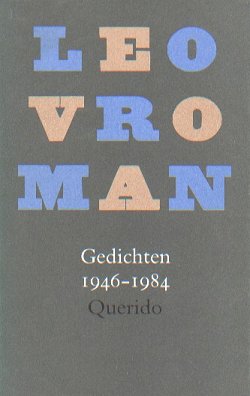
Leo Vroman overleden
Leo Vroman (Gouda, 10 april 1915 – Fort Worth, 22 februari 2014) was dichter, prozaïst, essayist, illustrator en hematoloog. Hij studeerde biologie in Utrecht en vluchtte in 1940 naar Nederlands-Indië. In 1945 werd hij uit Japanse gevangenschap bevrijd en vestigde zich in Verenigde Staten, waar hij tot op de dag van vandaag woonde, samen met zijn vrouw Tineke. Vroman debuteerde in 1946 met de bundel Gedichten. Talloze publicaties en zowat alle belangrijke literaire prijzen heeft hij op zijn naam staan.
Ik wil je zo makkelijk niet kwijt,
zie je liefst een hele tijd
naliggen en zitten
alsof je zo pas nog die witte
zakdoek hebt uitgespreid
op het bolle slapende beest.
Helaas, dit zoek ik het meest:
het schadeloos besmetten
van je alledaagse leven
om je bij voorbeeld even
het optellen te beletten
van geld, het verdelen van pap.
Dit klinkt misschien als een grap,
een fladder-, een eiwitlicht,
of zelfs kodderig gedicht.
Het is mij dodelijke ernst.
(Leo Vroman 1959)
fleursdumal.nl magazine
More in: Archive U-V, In Memoriam, Vroman, Leo

P.C. Boutens
(1870-1943)
Afvaart
De maanlicht-overvloeide vloed
Heft ‘t ranke spook van vlotte bom
Boven den zwarten menschendrom
Die vlekt het zilvren zand als roet.
De ketting waar zich ‘t schip aan windt,
Kreunt eenzaam als nacht-wakker kind.
Geen andre klank begint of duurt.
Het koele klikken langs de kiel,
Nu ‘t schip in voller water stuurt,
Reikt niet tot hier. Het slank profiel
Verbreedt onhoorbaar-onverwacht
Zich met der zeilen effen pracht.
Van duistre plecht onzichtbre han
In driemaal-op-en-neder-zwaai
Wuift licht vaarwel aan vriend en land
En heel de manelichte baai.
En donker wuift de kust weêrom
Van rijke vangst en wellekom…
Ik blijf niet langer op mijn plek
In ‘t avondduin. Mijn voet
Voelt onder zich het weifel dek
Van schip te deinen op den vloed.
En met nabije schaduw weet
Ik lichtste licht bekleed.
De breede ronding van de kust
Deinst lamp-bezet, maar doodsch.
Met geen sinjaal durft donkre loods
De stranden roepen uit hun rust…
Waar schuilt de stille school van buit
Waar vol meê keer’ de leêge schuit?
Of wordt in ‘t verre land en voor altoos
Ons wild verlangen schoon en stil? –
De zee is diep en eindeloos
Zooals vertrouwen wil
En wilde toen ‘t aan ‘t veilig strand
Te droomen zat van de’ overkant.
De wind bolt uit het ruime wak.
Het schip helt op zijn breede streek.
Nog even maar is de einder strak
En van kustlichten bleek…
En nu – niets meer dan heem’l en zee…
De zeilen over! Reê!
P.C. Boutens poetry
fleursdumal.nl magazine
More in: Archive A-B, Boutens, P.C.
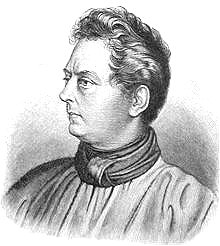
Clemens Brentano
(1778—1842)
Sie reist mit Schubert zum Achensee
Donnerstag 21. August 1834
Ich ziehe hin, du mußt es leiden
Schon flieht mein Schifflein auf dem See,
Und du stehst stumm, dort bei den Weiden,
Und wiegst dein Herz in bitterm Weh –
Das meine zuckt so hin und wieder,
An deinem hat’s nicht viel geruht
Mein Ruder hebt sich auf und nieder,
Wein’ in die Flut, ich bin dir gut!
Hör’ was zu tun, wenn ich verschwunden
Daß du nicht ganz vertrauern mußt,
Schau an mein Bild in deinen Wunden,
Wieg’ still mein Herz in deiner Brust,
Ich steig’ zum Berg, schleich’ durch die Tale,
Such’ Kühle in des Seees Flut –
Und dir genügt die blaue Schale,
In reiner Glut; ich bin dir gut.
O krankes Herz, dein glühend Lieben,
Glüht mir in jedem Abendrot,
Ist dir der Trost auch nicht geblieben,
Bleibt stets bei mir doch deine Not.
Und in der Abendglocke Tönen
Fühl’ ich bewegt, wie dir zu Mut
Fühl’ deine Tränen, fühl’ dein Sehnen,
In meinem Blut, ich bin dir gut.
O wär’ aus mir, was ich gesungen
Wär’s nicht in meinen Mund gelegt
Dann wär’ ein Quell aus mir entsprungen
Dem Durst, der deine Brust bewegt. –
Der Quell müßt’ bald die Kluft erfüllen,
Dein Ach und Weh und deine Glut
Könnt’ ich am Achensee dann stillen!
Ach werde gut, ich bin dir gut!
Clemens Brentano poetry
fleursdumal.nl magazine
More in: Archive A-B, CLASSIC POETRY
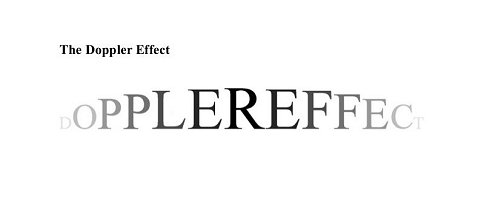
Rob Stuart: The Doppler Effect
Biography: Rob Stuart is a media studies lecturer, filmmaker and writer living in Southeast England. He has contributed poetry to a variety of magazines and e-zines including Ink, Sweat & Tears, Light, Lighten Up Online, Magma, New Statesman, The Oldie, The Spectator and Snakeskin.
fleursdumal.nl magazine
More in: *Concrete + Visual Poetry P-T, Rob Stuart, Rob Stuart, Stuart, Rob

The Sorrows of Young Werther (12)
by J.W. von Goethe
JUNE 19.
I no longer remember where I stopped in my narrative: I only know it was two in the morning when I went to bed; and if you had been with me, that I might have talked instead of writing to you, I should, in all probability, have kept you up till daylight.
I think I have not yet related what happened as we rode home from the ball, nor have I time to tell you now. It was a most magnificent sunrise: the whole country was refreshed, and the rain fell drop by drop from the trees in the forest. Our companions were asleep. Charlotte asked me if I did not wish to sleep also, and begged of me not to make any ceremony on her account. Looking steadfastly at her, I answered, “As long as I see those eyes open, there is no fear of my falling asleep.”
We both continued awake till we reached her door. The maid opened it softly, and assured her, in answer to her inquiries, that her father and the children were well, and still sleeping. I left her asking permission to visit her in the course of the day. She consented, and I went, and, since that time, sun, moon, and stars may pursue their course: I know not whether it is day or night; the whole world is nothing to me.
The Sorrows of Young Werther (Die Leiden des jungen Werther) by J.W. von Goethe. Translated by R.D. Boylan.
To be continued
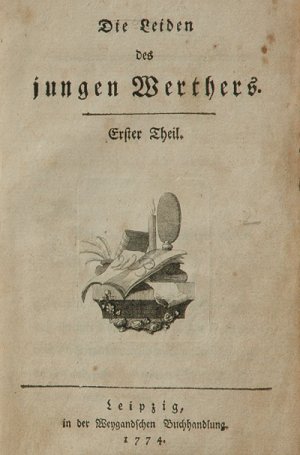
fleursdumal.nl magazine
More in: -Die Leiden des jungen Werther, Goethe, Johann Wolfgang von
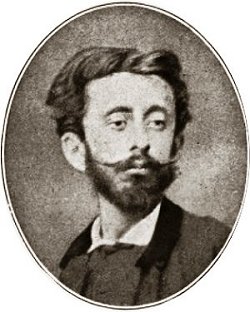
Tristan Corbière
(1845-1875)
A une camarade
Que me veux-tu donc, femme trois fois fille ?…
oi qui te croyais un si bon enfant !
– De l’amour?… – Allons : cherche, apporte, pille !
‘aimer aussi, toi ! .., moi qui t’aimais tant.
Oh ! je t’aimais comme.. un lézard qui pèle
Aime le rayon qui cuit son sommeil…
L’Amour entre nous vient battre de l’aile :
– Eh ! qu’il s’ôte de devant mon soleil !
on amour, à moi, n’aime pas qu’on l’aime ;
endiant, il a peur d’être écouté…
C’est un lazzarone enfin, un bohème,
Déjeunant de jeûne et de liberté.
– Curiosité, bibelot, bricole ?…
C’est possible : il est rare – et c’est son bien –
ais un bibelot cassé se recolle ;
Et lui, décollé, ne vaudra plus rien ! …
Va, n’enfonçons pas la porte entr’ouverte
Sur un paradis déjà trop rendu !
Et gardons à la pomme, jadis verte,
Sa peau, sous son fard de fruit défendu.
Que nous sommes-nous donc fait l’un à l’autre ?…
– Rien… – Peut-être alors que c’est pour cela ;
– Quel a commencé? – Pas moi, bon apôtre !
Après, quel dira : c’est donc tout – voilà !
– Tous les deux, sans doute… – Et toi, sois bien sûre
Que c’est encor moi le plus attrapé :
Car si, par erreur, ou par aventure,
Tu ne me trompais.., je serais trompé !
Appelons cela : l’amitié calmée ;
Puisque l’amour veut mettre son holà.
N’y croyons pas trop, chère mal-aimée…
– C’est toujours trop vrai ces mensonges-là ! –
Nous pourrons, au moins, ne pas nous maudire
– Si ça t’est égal – le quart-d’heure après.
Si nous en mourons – ce sera de rire…
oi qui l’aimais tant ton rire si frais !
Tristan Corbière poetry
fleursdumal.nl magazine
More in: *Archive Les Poètes Maudits, - Archive Tombeau de la jeunesse, Archive C-D, CLASSIC POETRY, Corbière, Tristan

A. E. Housman
(1859-1936)
Eight O’Clock
He stood, and heard the steeple
Sprinkle the quarters on the morning town.
One, two, three, four, to market-place and people
It tossed them down.
Strapped, noosed, nighing his hour,
He stood and counted them and cursed his luck;
And then the clock collected in the tower
Its strength, and struck.
A. E. Housman poetry
fleursdumal.nl magazine
More in: Archive G-H, Housman, A.E.
Thank you for reading Fleurs du Mal - magazine for art & literature